- Home
- Belva Plain
Heartwood Page 13
Heartwood Read online
Page 13
Lil had asked her to describe how she was going to decorate the ballroom, so she did some preliminary sketches of the flower baskets she planned to hang around the room. As far as Laura was concerned, flowers were the jumping-off point for any wedding. Once you knew what the bride’s favorites were, it was easy to choose a color scheme, music and even the food. Christina loved daisies, and this had suggested hanging baskets with big yellow organdy bows, and a fresh, springtime menu.
Laura started sketching, but it was hard to concentrate with all the laughter coming from the ballroom. The morning passed and she hadn’t gotten more than a couple of ideas down on paper. A shadow fell over her desk. “Have lunch with me,” said a voice she realized she would have recognized anywhere. “And by the way, the coverall lives up to its reputation.” The admiration was soft in his green-blue eyes. Then he added briskly, “It’ll photograph beautifully when we take shots of you.”
–—
She suggested that instead of going out for lunch, she could make sandwiches for herself and Nick, and he said yes. Jeff and Diana had already driven off to eat at some chain restaurant, so they were alone in the house. She thought for a moment that maybe she shouldn’t have made the offer, but it was too late. Besides, there was nothing wrong with offering a man a grilled ham and cheese sandwich. And there was nothing significant about the fact that she was using her most expensive Gruyère cheese and Black Forest ham. And anyway, Diana and Jeff would be back in less than an hour. So there was no reason for her hands to be shaking as she slid the sandwich into the buttered pan. But they were. She hoped he hadn’t seen it.
“Diana and Jeff seem very competent,” she said. “Have they worked with you long?”
“Jeff is an intern, straight out of photography school, and he’ll be around for another six months. Nice kid, but I’m not sure how good his eye is. Diana’s been with me for ten years. I don’t know what I’d do without her.”
She didn’t want to know more … shouldn’t need to know more. But she couldn’t seem to stop herself. “Ten years! My, that’s a long time!” she heard herself say in a horrid, perky voice.
“Yes. It’ll be rough for me when she goes.”
“Will that be happening any time soon?”
I’m just making polite conversation. Casual, polite conversation.
“Probably when I finish the shoot for this book. She and her girlfriend want to move to San Francisco.”
“Oh.” Diana had a girlfriend. It was not what Laura had expected to hear and it surprised her. Suddenly she felt frumpy and old-fashioned. He lived in a young, sophisticated world where people were not surprised when girls had girlfriends. She wasn’t prejudiced about such things but they did surprise her. The people he knew would be up on all the current fads. The women would wear chic hairstyles and the latest fashions and they would go to trendy bars and restaurants. She wore pink coveralls and spent her days making yellow organdy bows for hanging baskets of daisies. She was hopeless. And yet, Diana was not his girlfriend. She told herself there was no reason for her little sigh of relief.
A smell filled the air. “Oh no!” she wailed as she looked down at the frying pan. Scorched cheese, bread and ham were sticking to the bottom. “I can’t believe I did this. Any idiot can make a grilled cheese sandwich!” She dumped the pan in the sink and opened her freezer full of party food.
“What are you doing?” Nick asked.
“Finding something to defrost and cook. I don’t have any more Gruyère, so I can’t make sandwiches unless you’d like peanut butter and jelly.”
“Are we talking about some kind of exotic version of peanut butter you’ve ground yourself and a homemade jam?”
“No. Commercial peanut butter and plain old grape jelly in a jar. My daughter brings her friends home sometimes and they don’t like my fancy cooking.”
“Oh, I want a peanut butter and jelly sandwich.” He laughed. “I bet I’m the only person you’ve ever made one for.”
She laughed too. “The only person over the age of twelve.”
The sandwiches tasted surprisingly good. They washed them down with milk and for dessert they had some brownies with raspberry icing that she had left over from a baby shower she’d catered.
After he’d finished his brownie, Nick leaned back in his chair. “This whole thing … writing this book with Lil … getting all this attention … it’s unsettling for you, isn’t it? I mean, you like it, but you don’t know quite how to handle it.”
“I … Does it show that much?”
He shook his head. “You’re very good at hiding it. I happen to be a very astute fellow.”
“It’s just that I’ve never really had a great talent for anything. I’m not musical, or artistic. I’m not even that smart—certainly I’m not as smart as my brothers and my parents.”
Or my husband, she could have said. But she found she didn’t want to mention Robby.
“My mother has her doctorate, and my father is a brilliant physician. My brother Steve—he’s the one who’s getting married—is a lawyer who goes around the country saving people. There’s Jimmy, who’s a doctor, and Phil, who’s a very successful financier. And then there’s me. I’m the …” She trailed off, not wanting to finish.
“The pretty one?”
“The happy one. That’s my job. To be happy. No matter what.”
What was she doing? It would sound like she was whining, and he wouldn’t understand.
But he did. “That’s a hard job.”
“It can be.” She never opened up like this. And it wasn’t because she felt relaxed being alone with him here in her kitchen. She wasn’t relaxed at all, her pulse would be racing if she were to check it. It was that she wanted—no, she needed him to know her. And it had to happen now. Because in less than twenty minutes his assistants would be back from lunch. And in three months he would be gone from her life for good.
“It’s because I’m like my grandmother,” she said. And she told him about being a throwback to Nana, who had made such a beautiful life for her husband and her children. While she talked, she went to the sink to clean the scorched pan, and without interrupting her, he took it from her to dry. They were both careful—at least she was, and she thought he was too—not to let their hands touch.
“And here I am, doing the same kinds of things Nana did … only she did it all for the family and I do it for my business,” she finished up her story.
“A very successful business,” he said, and once again, there was no mistaking the admiration in his eyes. It was so … exhilarating. Suddenly she was ashamed of herself. What was she doing, getting carried away because a total stranger was impressed with her? What was it that Robby had said? That she catered parties for rich, spoiled people. “I’m not exactly coming up with a solution for world peace …”
“How trivial of you,” Nick said.
“That’s me, the flighty type.”
They both laughed at that. But then his face got serious. “In my family I’m the trivial one.” He was looking off into space, and she knew that now he was going to tell her about himself, and he was doing it because he needed her to know him as much as she’d needed him to know her. “My father is dead now, but when he was alive he was a professor of English literature. He taught at Harvard, among other places. My mother was an opera singer with a promising career before she married and had me and my younger brother, Sam. Sammy, by the way, does something esoteric with mathematics that I will never begin to understand. He has also taught at Harvard.”
We’re two of a kind, she thought. That’s what he wants me to know. In spite of the bright shining world he lives in, we’re two of a kind.
“As I’m sure you can imagine, my parents weren’t very happy when their elder boy—the one who was named after his father—quit school to spend his time interning with commercial photographers. The important word in that sentence was ‘commercial.’ As far as my folks were concerned, it would have been all right if I’d gone t
he artistic route, running around the country taking gritty pictures that would never sell, and having little shows in small galleries that no one has ever heard of. Starving in a garret would have been noble. But when I finally got my first job, it was at an ad agency. I took pictures of coffee and canned soup.” He smiled a little sadly. “I always wanted to make money, you see. And I did. Because I really enjoyed getting lighting right, so that a cup of coffee looked like it was steaming in the print ad. I love what I do.”
I know. I watched you today. I saw you working harder than either Jeff or Diana, and I knew you did it because you love what you do. I know that about you.
“And now people like Lil ask for me to work with them.” He looked a little embarrassed and his face got red. “In fact, they compete to get me. I’m in demand. And I love that too.” He folded the dish towel he’d been using. “My father would say I’m wasting my time.”
She forgot her earlier restraint and reached out to touch his hand. “No, you’re not.” His hand was warm, and his fingers were long and strong. She pulled her hand back. His green-blue eyes blinked. “I love what I do too,” she said.
“I know that.”
He was staring at her and she was staring at him, and the silence in the kitchen was roaring around them. He was from a scarily sophisticated world she didn’t know. And she was married.
“I should get back to work. My daughter will be home in a couple of hours,” she said.
Saying that Katie would be coming home broke whatever spell had been going on. As she had meant it to. But she’d wished it hadn’t.
“And I need to finish setting up the lights,” he said. He left the kitchen.
The next time he came to the house, he didn’t have lunch with her. After that one time, he went out to eat with Jeff and Diana.
–—
But something had happened to Laura during the brief moment they’d shared in her kitchen. After that day, she found it harder and harder to keep from criticizing Robby. It seemed to her that he complained all the time about everything. Sometimes when she was listening to him, an image of Nick, laughing at something she’d said, would flash through her mind. She would banish the thought fast. She could not, would not, compare the two men. It wasn’t Robby’s fault that she’d had peanut butter sandwiches with a man who smiled at her and laughed at her jokes. She was the one who had changed, not him. So when she went to sleep at night she was not going to let herself think of green-blue eyes.
Instead, she dreamed of her mother’s huge, disapproving, dark ones. And then the eyes in her mother’s face became the eyes in the portrait she and Katie had seen in the shop on Madison Avenue.
Chapter Eighteen
Katie was going to be a junior bridesmaid in Steven’s wedding, so Iris and Theo had driven out to Laura’s house to see the child model her gown. They were in the kitchen, eating the salad Laura had prepared for lunch and chatting while they waited for Katie to emerge from her bedroom.
“How does Robby feel about having all those people in his house, photographing everything?” Iris asked. “It seems like they’ve been here forever.”
Laura looked at her mother taking a forkful of avocado and had to block an image of herself sitting at this same table with Nick. “It’s only been three months,” she said. “And the photographer has finished for the moment. He won’t be back again until the day of the wedding, to take the final shots for the book. Then that will be the end of it.”
And I won’t see Nick again.
“I have to say, I’m glad. It must be hard to have your privacy invaded. Maybe you should think again about hiring out your home for parties—”
“Wasn’t that the reason why Laura and Robby bought this house?” Theo broke in. “I thought it was understood that Laura would use it for her business.”
“We always planned to live over the shop, Mom.”
Iris looked through the kitchen door to the ornate dining room beyond it. It would never have been her taste, Laura knew. Her mother liked things sleek and modern. It was Anna who’d had a beautiful old Victorian house. “You may have planned that, but people are allowed to change their minds,” Iris said. “Maybe living over the shop isn’t as easy for Robby as he thought it would be.”
“I’m sure if Robby feels that way, he’ll tell Laura about it. A man doesn’t need his mother-in-law to fight his battles for him,” Theo said. And from the distaste in his voice Laura was sure he’d overheard Robby complaining to Iris.
Why not? Laura thought wearily. Robby complains to his own mother every night on the phone.
“Well, here I am,” a little voice behind them said. Katie walked into the room.
–—
Theo watched his granddaughter make her way toward them. She was walking a little self-consciously, a little girl on the verge of becoming a young lady, wearing her very first party dress. There was a picture of Iris at her age and as everyone always said, Katie looked just like her. But, oh, what a difference there was between them! Iris had been afraid even at that young age that she wasn’t pretty. It was clear that Katie wasn’t troubled by such thoughts. Her head was high as she walked toward them, and her eyes were shining.
“Katie, you’re as pretty as a picture,” Iris said.
And she did look like a picture; a slightly quaint and sweet illustration from a child’s fairy tale. There were no ruffles on the dress, no lace or bows to overwhelm Katie’s small frame. Two fabrics had been used, one was silky, and over it, the second was light as gossamer. The long skirt floated down to Katie’s feet, adding to her fairy-tale appearance. And although the dress was yellow and Theo would have thought that would not be a good color for a little girl whose complexion tended to be sallow, this was such a light creamy shade that it was flattering. More important, somehow the charming little dress captured everything that was unique and special about Katie. Clever Laura, for of course it was she who had chosen the pattern and had it made for her daughter. She’d done well. But then, Laura always did do well.
He looked at her now, and he frowned slightly. She wasn’t happy these days. She pretended to be her usual cheerful self, but he could tell. And he was certain he knew why. Something had changed inside her, and she had realized that she was no longer in love with her husband. Now she was trapped because she was a good woman and she would not walk away. He’d known many such women over the years—he had comforted a few in ways that a married man should not have, if truth be told—and he’d always thought it was a small tragedy. Particularly if the husband was the kind of self-serving, self-pitying man his son-in-law had become.
Theo turned to look at his wife, who was praising Katie in her party dress. Iris still thought of Robby McAllister as the bright young man who had had so much promise when he married Laura. Well, not everyone fulfilled their promise, that was just a sad fact of life. And sometimes a person like Laura exceeded all expectations—that was a fact of life too. But Robby was jealous of her because of it. And Theo had seen her try to make him feel better by playing down her own accomplishments. Should she have to do that to save her husband’s fragile ego? Shouldn’t she be proud of herself and say so?
But what about the marriage, he could hear Iris cry. What will happen to it if Laura continues to be more successful than Robby is? And it was true that when Theo was Robby’s age he couldn’t have stood that. But that was another time. And damn it, this was his daughter!
His tricky heart fluttered unpleasantly in his chest, reminding him that he wasn’t supposed to get agitated. Well, he couldn’t help that any more than he could help eating the occasional forbidden piece of pastry or sneaking a bit of salt onto his food. A man had to have his pleasures, no matter how much his loved ones tried to protect him from them.
But now he was exhausted. That had been happening more often lately. The truth was, he probably didn’t have a lot of time left. He still couldn’t talk to Iris about it; she was determined to keep him alive forever. But the doctor in him knew it to
be a fact. Since his heart attack, he’d had two minor incidents, and then a few weeks ago, there had been a more serious one. He and Iris had agreed not to tell the children about that one because there was no point in scaring everyone at such a happy time, but when a day like today could tire him so badly, it was not a good sign.
He wasn’t sure how he felt about that; obviously he didn’t want to die, no one did. But he had already cheated death twice: once when he’d had his heart attack, and another time, so much earlier, when he alone of his entire family had survived the slaughterhouse that was Europe during the thirties and forties.
He had had the chance to establish a second family. A beautiful strong family of Americans who had a birthright to be as happy as it was in their nature to be. All of them, it seemed, except his Laura. Anna always said she was the one in his family that no one would ever have to worry about, but Anna had been wrong. The boys would take care of themselves. With the typical male instinct for self-preservation, they would see to it that they had what they needed. But Laura, his lovely smiling girl, would break her heart trying to please everyone else. And that was wrong. Someday he would have to tell her that. Someday soon. Before it was too late. The fluttering in his chest had turned into tightness. He took a pill out of his coat pocket. Instantly Iris saw it.
“Theo? Are you all right?” she demanded as she leapt to her feet to get him a glass of water. “It’s all my fault, I shouldn’t have let you stay out so long.”
“I’m a grown man,” he protested. But he took the glass of water, and allowed himself to be clucked over. His wife ended the visit and he was grateful for it. As he walked with Laura—slowly, and carefully—out to the car, which Iris would drive home, he said, “Your mother and I are proud of you.” It was the best he could do.

 The Golden Cup
The Golden Cup Her Father's House
Her Father's House Whispers
Whispers Crescent City
Crescent City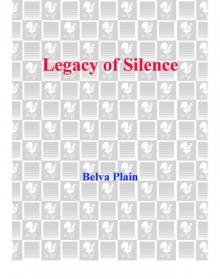 Legacy of Silence
Legacy of Silence Crossroads
Crossroads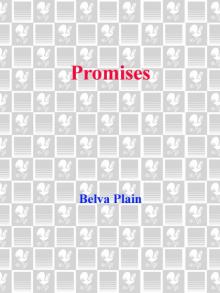 Promises
Promises After the Fire
After the Fire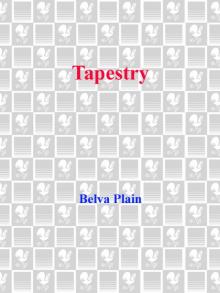 Tapestry
Tapestry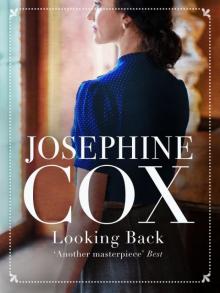 Looking Back
Looking Back Heartwood
Heartwood The Carousel
The Carousel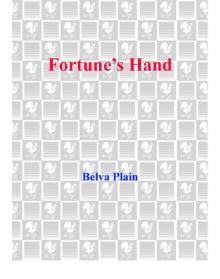 Fortune's Hand
Fortune's Hand Homecoming
Homecoming Random Winds
Random Winds Harvest
Harvest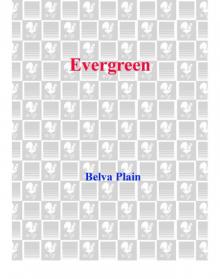 Evergreen
Evergreen Treasures
Treasures The Sight of the Stars
The Sight of the Stars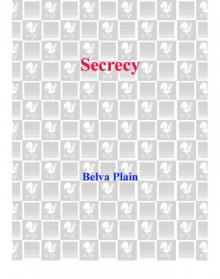 Secrecy
Secrecy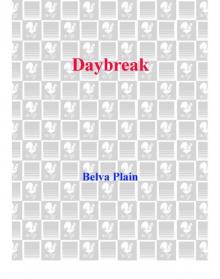 Daybreak
Daybreak Eden Burning
Eden Burning